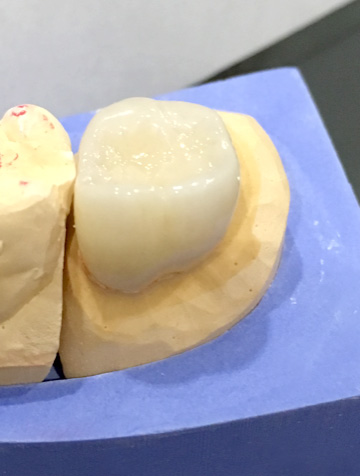
Back in the Hollywood heydays, film stars routinely had their teeth “capped” or crowned to improve their smile and appearance. This procedure was less available to ordinary mortals, but over the years dental science has found ways to make it affordable and accessible for everyone.
Here’s the low-down on crowns, reasons why you might need them, what’s involved and the options to choose from.
Caps and crowns are basically the same thing, and are hollow, artificial tooth coverings used to hide a damaged or unsightly tooth. In dental terms, they are fixed prosthetic objects cemented onto your teeth. The main purposes of a crown are to hide and protect damaged teeth or implants, but they also strengthen your mouth, improve your overall appearance and resolve alignment issues. They look almost exactly the same as the natural teeth, and can be used to cover up and hide a discoloured, crooked or unsightly tooth.
As much as we try to keep our teeth healthy these days, sometimes you aren’t able to protect or restore a tooth after injury or infection. Dental crowns are an option that provide complete coverage of almost any damaged tooth, especially those where restorative and cosmetic treatments aren’t able to resolve the problem. Having a crown fitted restores the tooth, and protects it from future damage.
Once a crown has been installed, it looks very much like a natural tooth. After filling a tooth cavity that extends across half of the tooth width or more, your dentist will usually recommend fitting a crown over it to support the remainder of the tooth. This also applies to root canal treatments, which leave the tooth hollow and at risk of cracking.
Crowns can also be used to strengthen a tooth in danger of breaking, or restore one that has already broken. They can hold together parts of a cracked tooth, rebuild one that is badly worn, or cover odd-shaped teeth. Dental bridges and implants use crowns to anchor them in place and provide replacements for missing teeth.
Crowns come in several materials. Until recently, one of the most commonly-used materials is ceramic. This is made from a porcelain-based material, and was used for front teeth because of its ability to blend in. Crowns that are porcelain-fused to metal are very durable, and have a stronger bond because of the connection with a metal structure. Base metal or gold alloys provide very strong crowns with powerful bonding abilities, that don’t fracture, corrode or wear away the tooth. These types of crowns are being used less now, though, and have been mostly overtaken by the use of Emax and zirconia crowns.
Emax crowns are made from lithium disilicate glass, which is ideally suited to crowns and veneers for the front teeth. They are used most often when you only need a crown on a single tooth, and are fitted in two appointments in most cases.
Zirconia crowns are made from zirconium dioxide (ZrO2), which is also used to make hip, ear and finger prostheses for surgical replacement. It’s naturally white, and solid zirconia is opaque and tough, which is perfect for back teeth.
Translucent zirconia looks good and works well for front teeth, and both types are 100% biocompatible for patients so no allergies develop.
Fitting an Emax or zirconia crown is done quickly and conveniently in your dentist’s office. The dentist prepares for the treatment by prepping, creating impressions and temporizing at one appointment. The dentist matches the shade of your natural teeth and a machine cuts the tooth out of a block of lithium material or zirconium. The treatment then proceeds by inserting and cementing the lab fabricated crown at a second appointment.
The dentist positions the material in your mouth and makes any final adjustments before cementing it to the tooth. Of course, if your crown is being fitted after a root canal procedure or as part of a greater dental restoration process you may need several visits to complete the whole process.
For more information on the types of crowns we provide or to schedule an appointment with Dr. Handler, please contact 416-267-4661.
Do you ever feel nervous about dentist appointments? Rest assured: we cater to nervous and anxious patients in a gentle and considerate manner. Call us now to schedule a free consultation!